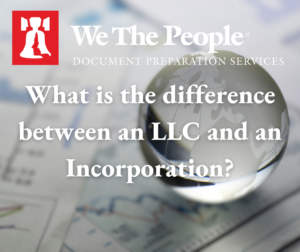
What is the difference between an LLC and an Incorporation?
When starting a business, one of the most important decisions you will make is choosing the right legal structure. Two popular options are Limited Liability Companies (LLCs) and Incorporations (Inc.). While both structures offer liability protection for business owners, there are some key differences between the two.
In this blog post, we will explore the differences between LLCs and Incorporations to help you make an informed decision.
1. Formation and Ownership
In California, both LLCs and Incorporations are formed by filing documents with the California Secretary of State’s office. LLCs are typically easier and less expensive to form than Incorporations. In California, an LLC can be formed by filing Articles of Organization with the Secretary of State. An LLC can have one or more owners, who are referred to as members.
On the other hand, Incorporations in California require filing Articles of Incorporation with the Secretary of State and issuing stock to shareholders. There are also more formalities that must be followed, such as holding annual meetings and keeping minutes. An Incorporation in California can have one or more shareholders.
2. Liability Protection
Both LLCs and Incorporations offer liability protection for business owners in California. This means that the owners are not personally liable for the debts and liabilities of the business. Instead, the business is responsible for its own debts and liabilities.
3. Taxation
LLCs and Incorporations in California are taxed differently. LLCs are typically taxed as pass-through entities, meaning that the profits and losses of the business are passed through to the owners’ personal tax returns. This means that the business itself does not pay taxes.
Incorporations in California, on the other hand, are subject to double taxation. This means that the business itself is taxed on its profits, and then the shareholders are also taxed on any dividends they receive.
4. Management and Control
LLCs and Incorporations also differ in terms of management and control in California. LLCs are typically managed by the members, or they can appoint a manager to handle day-to-day operations. This gives the members more flexibility and control over the business.
Incorporations in California, on the other hand, are managed by a board of directors, who are elected by the shareholders. This structure can be more formal and may limit the control of individual shareholders.
Choosing the right legal structure for your business in California is an important decision that should not be taken lightly. LLCs and Incorporations both offer liability protection for business owners, but they differ in terms of formation, taxation, management, and control. If you’re ready to form your LLC or Incorporation, contact us to get started today.
Disclaimer: This content is for informational pruposes only and should not be considered legal advice. Consult with a licensed and qualified attorney for advice specific to your situation.
This text is property of We The People® and may not be copied, printed, or distributed in any fashion.

